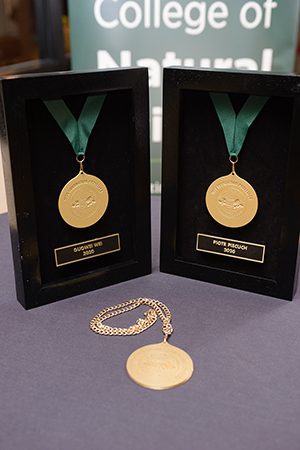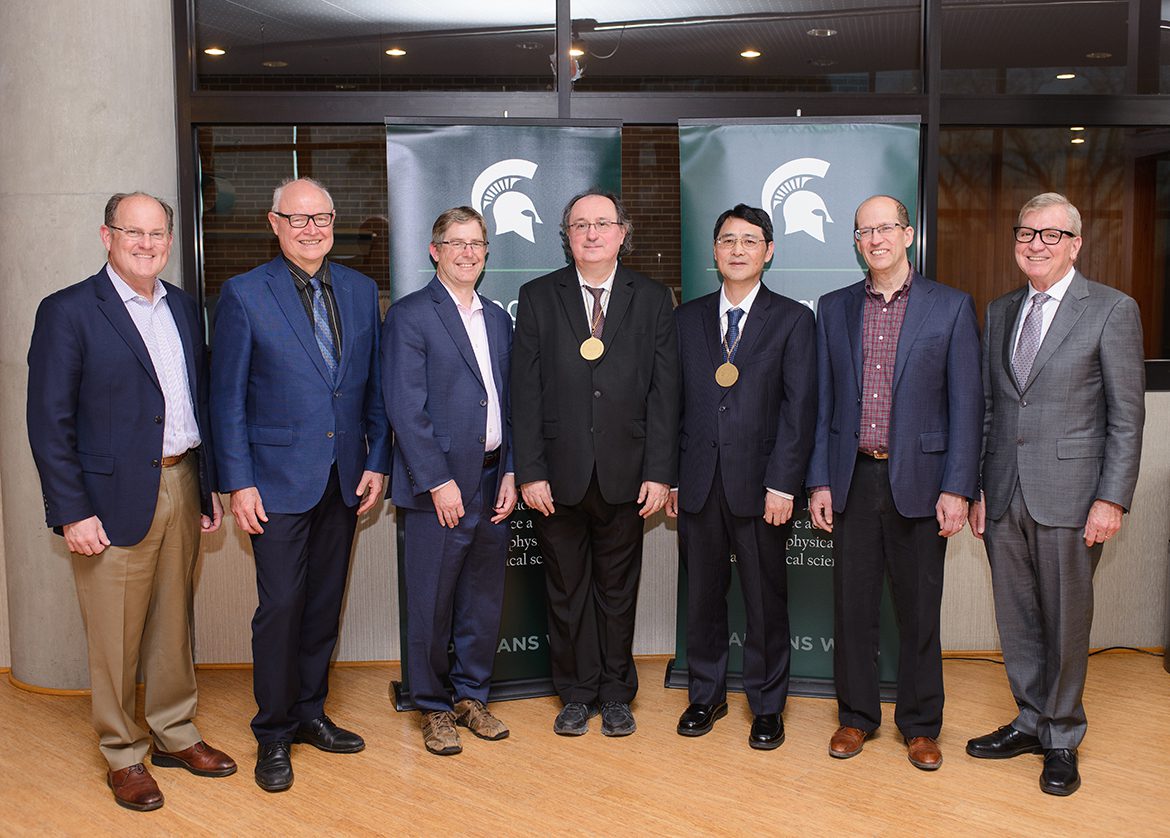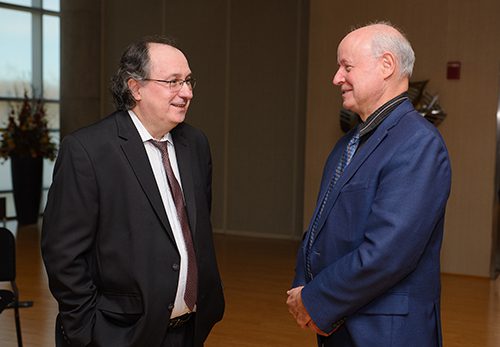Michigan State University researchers Piotr Piecuch and Guowei Wei were formally honored as MSU Research Foundation Professors at an investiture ceremony held on Nov. 14 in the Wharton Center’s Christman Lounge.
Together with the Office of the Provost and the Office of Research and Innovation, the Michigan State University Research Foundation established its professorship awards in 2014 to help recognize, retain and recruit faculty exemplifying research and scholarly excellence.

“Both Professor Piecuch and Professor Wei are part of an outstanding group of MSU scholars who contribute at an extraordinary level to the search for new knowledge and enhance the university’s international research reputation,” said Doug Gage, vice president for Research and Innovation at MSU.
“These professorships are awarded to only the most outstanding faculty in the university and are meant to recognize exceptional leadership and research productivity,” said Phil Duxbury, Dean of the College of Natural Science. “Having Piotr and Guowei as MSU Research Foundation Professors will help guarantee the continued growth of the quality and impact of scholarship in their departments, the college and their respective fields.”
To earn the rank of MSU Research Foundation Professors, faculty are first nominated by their deans and that nomination must receive “substantial and laudatory” support from their peers.
“In our profession, there is nothing more gratifying than being recognized by one’s peers,” said Piecuch, who is also a University Distinguished Professor in the Department of Chemistry and an adjunct professor in the Department of Physics and Astronomy. “I was overwhelmed at first, but I am, and will always remain, extremely grateful for this honor.”
“I feel very excited,” said Wei, who has appointments in the Department of Mathematics and the Department of Biochemistry and Molecular Biology. “I’ve been at MSU for almost 20 years, and this feels like a new start for me.”

Along with the permanent title of MSU Research Foundation Professor, Wei and Piecuch will receive additional scholarly support, which typically lasts five years from the award date.
“This has enabled me to really focus on my team and my research,” Wei said. “I’m very thankful for the research environment at MSU.”
“The financial resources provided by the MSU Research Foundation Professorship have allowed my group to explore new research directions,” Piecuch added.
Although Wei and Piecuch both officially earned this title and the support it entails in 2020, the College of Natural Science was forced to postpone the formal celebration of the distinction due to the global coronavirus pandemic.

Three years later, however, the two researchers were able to receive their medallions in front of their friends, colleagues and family members — as well as share presentations about their work.
Wei’s group combines expertise in artificial intelligence with mathematical tools from topology and algebra to develop innovative approaches to solving medical issues, such as drug discovery. As the coronavirus pandemic started, however, Wei’s team turned its attention to predicting the precise mutations that would lead to new variants of concern in the evolving Covid-19 pandemic.
Wei and his team are using this newly developed predictive power to help researchers identify viruses of concern and to help prepare vaccines ahead of time. They are finding applications for their tools in several other pressing issues, including climate change and drug use disorders.
“In short, Guowei is an applied mathematician who develops cutting-edge techniques to attack real world problems,” said Keith Promislow, who was chair of the Department of Mathematics from 2014 through 2022 and is now associate chair.
“His group attracts many visitors and collaborators to the department, and he consistently recruits excellent graduate students and post-doctoral researchers.”

Piecuch and his group develop quantum-mechanical theories and computational tools that enable them, their collaborators and researchers worldwide to probe a wide range of questions in chemistry and atomic, molecular and nuclear physics. He is also a coauthor of the widely used General Atomic and Molecular Electronic Structure System, or GAMESS, software.
It’s so successful, that it has resulted in Piecuch being banned from using a competing, commercial software package. Piecuch, however, makes his group’s research and tools freely available. The impact of this is evident in the more than 16,500 citations of Piecuch’s work. Among them is a 2020 article about GAMESS that has been cited around 800 times since Piecuch was named an MSU Research Foundation Professor.
“Piotr also has an amazing ability to turn students who join his group into top-notch, independent scientists,” said Timothy Warren, chair of the Department of Chemistry. “Piotr is known for the close mentorship of his students that enables them to work at the frontiers of the field alongside him.”
Piecuch and Wei both expressed their gratitude to the college, their departments as well as the MSU Research Foundation, a sentiment echoed by Gage and Duxbury. Since 1974, the organization has provided close to $400 million in support of the university.
“We are so very pleased to have the MSU Research Foundation Professorships in place because they so neatly fit into the strategic plan for MSU and will contribute to the goal of continuing our leadership as a world-leading research university,” said David Washburn, executive director of the MSU Research Foundation.
This story was originally published by the MSU College of Natural Sciences
